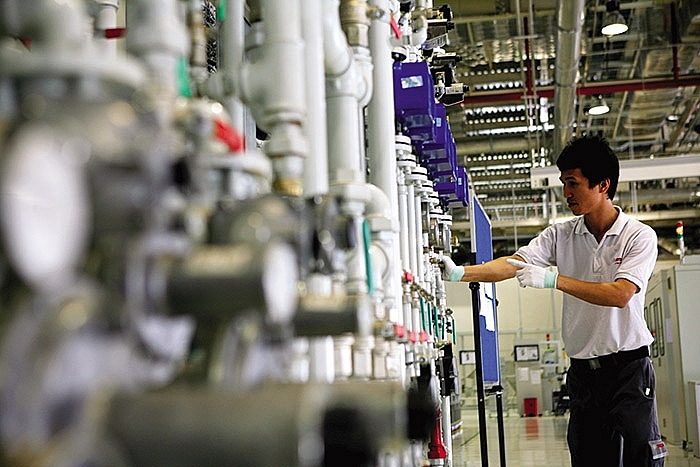Vietnam’s newest corridor to Europe
 |
| Together, the EVFTA and the IPA will not just attract new European investment, but give those investors greater confidence in Vietnam Photo: Le Toan |
 |
| Nicolas Audier |
Europeans investing in Vietnam want a predictable, fair, and stable trade and investment environment. Since the doi moi reforms began Vietnam’s process of economic liberalisation, the government has made positive and progressive changes to encourage foreign direct investment (FDI) and make Vietnam a more attractive destination for foreign companies, and these reforms continue to bear fruit.
Indeed, earlier this month, EuroCham was proud to attend the ‘30 Years of FDI’ conference in Hanoi, sharing insights and recommendations with the government as well as the domestic and international business communities.
Foreign investment has been the engine of Vietnam’s growth over the last three decades, and attracting more FDI in the future is key to unlocking the next phase of Vietnam’s economic development. The government recognises this and has been deepening Vietnam’s international integration through new-generation free trade agreements, foremost among which is the EU-Vietnam Free Trade Agreement (EVFTA).
While the EVFTA was agreed in December 2015, it has since been split into two parts: the provisions relating to trade (which are an exclusive competence of the EU) and those relating to investment protection.
Together, the EVFTA and the Investment Protection Agreement (IPA) which accompanies it will not just attract new investment from Europe, but also give European investors greater confidence and protection when investing here.
In short, an IPA ensures that investors and their investments are protected from discrimination and unfair treatment. In this particular agreement, Europe and Vietnam have chosen to create an innovative dispute-resolution mechanism to settle disputes between states and investors.
By establishing a permanent ‘Tribunal,’ the IPA between Europe and Vietnam should be a step above current arbitration-based resolution, which has been criticised for being too much in favour of investors.
The IPA Tribunal contains two important provisions which will protect EU investors in Vietnam. First, the tribunal will be independent. This is important, as it means that domestic courts on either side cannot intervene or override decisions of the tribunal. This will ensure fair, transparent and impartial decisions.
It should help to address some of the issues our members have raised in recent editions of the Whitebook, EuroCham’s annual report of trade and investment issues and recommendations.
In particular, despite recent improvements, foreign investors in Vietnam often prefer to settle disputes through arbitration, as a perceived lack of judicial independence means these investors tend to avoid Vietnamese courts to settle disputes.
Second, the tribunal will be balanced. It will be made up of nine members, with three each from Europe and Vietnam and a further three from another state. Three members of this panel will adjudicate on a particular dispute, with one member from each of the three parties. For appeal hearings, the panel will include six members, with two being selected from each side and a further two from the independent nation.
The IPA also includes another important provision: alternative dispute resolution. This gives either side the option to request mediation in Hanoi, Brussels or the respective EU member state’s capital. If this mediation is unsuccessful, the issue can be escalated to the tribunal at a later date.
Over and above this tribunal, the IPA also provides further protection to European investors in Vietnam. In particular, it contains a more detailed definition of ‘fair and equitable treatment’ than most bilateral treaties, which should prevent local authorities from imposing unfair measures on European investors. In practice, this means that local authorities must, for example, meet the fundamental principles of due process in judicial and administrative proceedings.
These issues matter to European investors. In our new report published this month, “The EU-Vietnam Free Trade Agreement: Perspectives from Vietnam,” we asked our members how the EVFTA would affect their business and investment plans once it has been ratified and implemented. The results were clear and unequivocal: one-third of EuroCham members said that the EVFTA would have a “significant” impact on their business or investment plan in the medium-term, with almost half (45 per cent) predicting a “moderate” impact.
In total, around eight in 10 EuroCham members taking part in our research predict that the EVFTA will have a positive impact on their business plans in the medium-term. This is a slight increase against our last report in 2017, when 76 per cent of respondents said that the EVFTA would have either a “significant” or “moderate” impact.
Looking further ahead to the long-term survey figures, these are even more impressive: 85 per cent of our members predict either a “significant” (40 per cent) or “moderate” (45 per cent) impact on their business plan once the EVFTA comes into force. Once again, this is consistent with our findings in 2017, when 85 per cent of our members also responded that the EVFTA would have either a “significant” or “moderate” impact.
This is because the IPA will help to address some of the issues that EuroCham’s 16 sector committees – working groups that represent our 1,000 members – have raised in recent editions of our Whitebook. These include issues, such as judicial recourse, arbitration, public-private partnerships, and mergers and acquisitions. If the government can continue to reform the legal framework to address these concerns, it would help Vietnam to prepare for the implementation of the IPA and further increase the confidence of foreign investors.
For this reason, EuroCham has been a strong supporter of the EVFTA – and the IPA that accompanies it – ever since negotiations first began. Earlier this month, we led a delegation of almost 20 representatives to Brussels to advocate for their swift ratification and implementation. During our meetings with four EU commissioners, senior EU officials, members of the European Parliament and other stakeholders, we found widespread support for both deals, and optimism about their prospects for ratification.
Trade and investment between the EU and Vietnam have been growing over the last decade. Figures from Vietnam’s Ministry of Planning and Investment show that in 2017 European firms had almost 2,500 investment projects worth around $44 billion in Vietnam, making up 10 per cent of the total foreign-invested projects and 14 per cent of the FDI capital.
Once ratified and implemented, the IPA will provide a more secure, predictable trade and investment environment, better aligned with international norms and practices.
Together, the EVFTA and the IPA are a true ‘win-win’ for both Europe and Vietnam. The EVFTA will further open up Vietnam’s fast-growing market to European investors, while the IPA will give those investors greater confidence and protection in order to grow their trade and investment. This ultimately means greater access to high-quality European goods and services for consumers in Vietnam.
What the stars mean:
★ Poor ★ ★ Promising ★★★ Good ★★★★ Very good ★★★★★ Exceptional
Related Contents
Latest News
More News
- Foreign leaders extend congratulations to Party General Secretary To Lam (January 25, 2026 | 10:01)
- 14th National Party Congress wraps up with success (January 25, 2026 | 09:49)
- Congratulations from VFF Central Committee's int’l partners to 14th National Party Congress (January 25, 2026 | 09:46)
- 14th Party Central Committee unanimously elects To Lam as General Secretary (January 23, 2026 | 16:22)
- Worldwide congratulations underscore confidence in Vietnam’s 14th Party Congress (January 23, 2026 | 09:02)
- Political parties, organisations, int’l friends send congratulations to 14th National Party Congress (January 22, 2026 | 09:33)
- Press release on second working day of 14th National Party Congress (January 22, 2026 | 09:19)
- 14th National Party Congress: Japanese media highlight Vietnam’s growth targets (January 21, 2026 | 09:46)
- 14th National Party Congress: Driving force for Vietnam to continue renewal, innovation, breakthroughs (January 21, 2026 | 09:42)
- Vietnam remains spiritual support for progressive forces: Colombian party leader (January 21, 2026 | 08:00)

 Tag:
Tag:




















 Mobile Version
Mobile Version